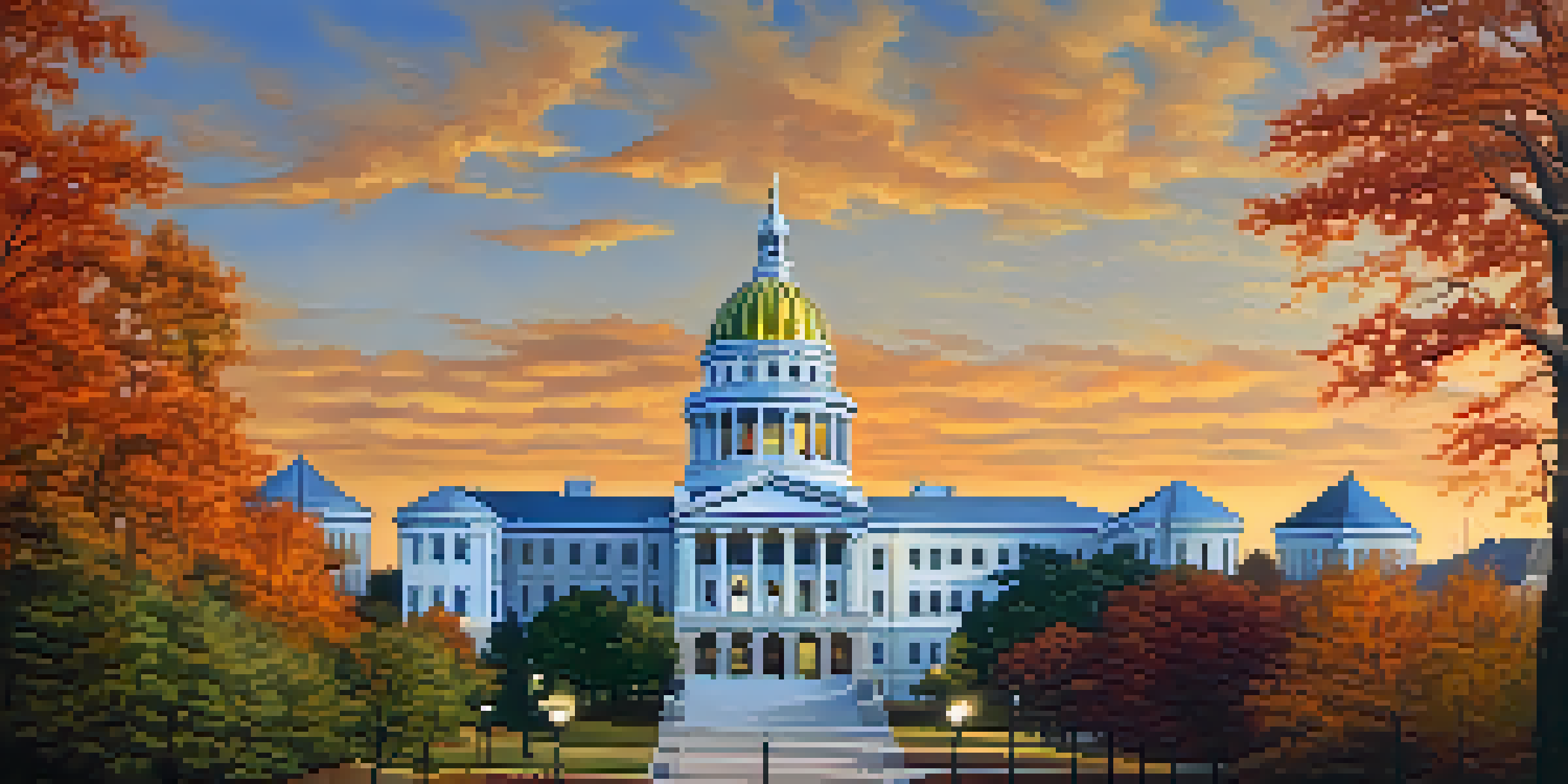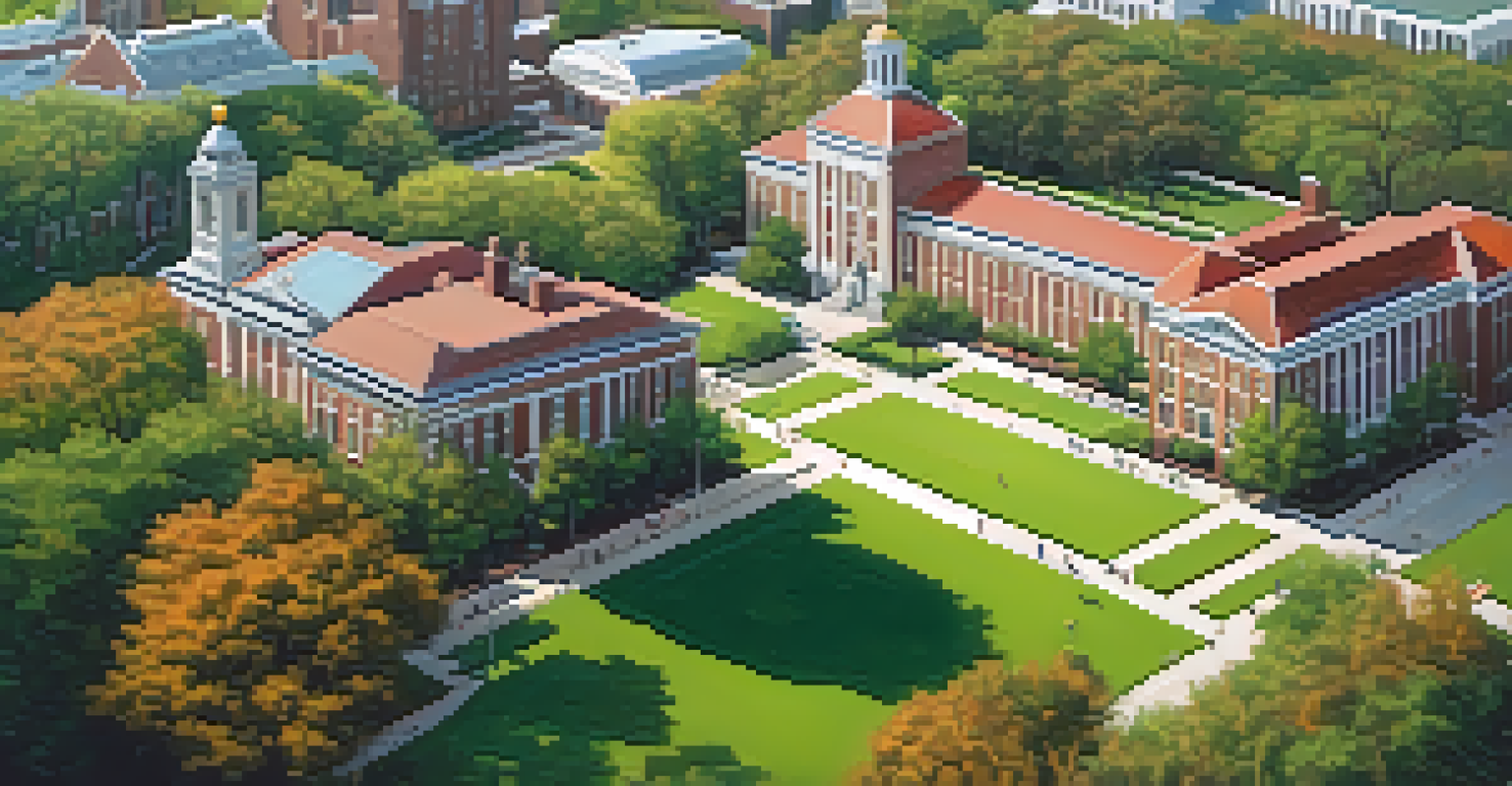Raleigh's Influence on North Carolina's Political Landscape

The Birth of Raleigh: A Political Powerhouse
Founded in 1792, Raleigh was chosen as the capital of North Carolina due to its central location. This strategic choice has allowed it to emerge as a political powerhouse, influencing the state's governance. The city was designed with politics in mind, featuring a layout that facilitates access to key government institutions.
The best way to predict the future is to create it.
As the seat of the state government, Raleigh hosts the North Carolina General Assembly and the Governor's Mansion. This central role has made it a magnet for political activity and advocacy, drawing in decision-makers and lobbyists alike. The city's political landscape is further enriched by its diverse population, which brings varied viewpoints to the table.
Raleigh's establishment as a planned city reflects the aspiration for a more organized and efficient government. This vision has contributed to the city’s ongoing influence in shaping North Carolina's political identity and governance structures.
Raleigh's Role in State Legislation
Raleigh serves as the heart of North Carolina's legislative process, where laws are proposed, debated, and enacted. The North Carolina General Assembly, comprised of the Senate and House of Representatives, meets annually to tackle pressing issues ranging from education to healthcare. Decisions made within these walls have lasting impacts on the lives of residents across the state.

Legislators and their staff work tirelessly in Raleigh, often collaborating with think tanks and advocacy groups to formulate policies. The proximity of these resources enhances the quality of the legislative process, allowing for informed decision-making. This collaborative environment fosters innovation and responsiveness in governance.
Raleigh: A Political Powerhouse
Raleigh's central location and planned layout have established it as a key political center in North Carolina.
Moreover, Raleigh's political climate encourages civic engagement, with citizens often participating in public hearings and community forums. This active participation not only shapes legislation but also empowers residents to voice their concerns and aspirations.
The Influence of Education Institutions
Raleigh is home to several esteemed higher education institutions, including North Carolina State University. These universities play a crucial role in shaping the state’s political landscape by producing informed citizens and future leaders. They also serve as research hubs that provide data and insights to inform policy decisions.
Democracy is not a spectator sport.
Students and faculty often engage in political discourse, influencing local and state politics through advocacy and research initiatives. For instance, university-led studies on environmental issues can impact legislation related to sustainability and conservation efforts. This academic influence adds depth to Raleigh's political dialogue.
Moreover, educational institutions encourage students to participate in internships and civic activities, further bridging the gap between academia and politics. As a result, Raleigh not only nurtures future political leaders but also enhances the overall political literacy of the community.
Raleigh's Role in Local Government Dynamics
Raleigh's influence extends beyond state politics, significantly impacting local governance. As the capital, it sets a precedent for how local governments operate and engage with citizens. The city's municipal policies often serve as a model for other municipalities across North Carolina.
The City of Raleigh has adopted progressive policies in areas such as urban planning and sustainability, which other cities monitor closely. This leadership role has positioned Raleigh as a trendsetter, prompting surrounding areas to adapt similar initiatives to improve their governance. It demonstrates how a capital city can lead by example.
Education Shapes Political Landscape
Higher education institutions in Raleigh contribute significantly to the political dialogue and civic engagement in the state.
Additionally, the local government in Raleigh actively seeks community input, fostering a sense of ownership among residents. This participatory approach not only enhances transparency but also strengthens the bond between citizens and their government.
The Impact of Cultural Diversity on Politics
Raleigh's diverse population plays a vital role in shaping the city's political landscape. With a mixture of cultures, ethnicities, and backgrounds, the city reflects a wide array of perspectives that influence policy discussions. This diversity enriches the democratic process by ensuring that various voices are heard and considered.
Cultural organizations and community groups in Raleigh advocate for issues affecting their constituents, from immigration reform to social justice. These grassroots movements often gain traction, prompting local and state politicians to address their concerns. The result is a more inclusive political environment that reflects the community's values.
Furthermore, this cultural diversity fosters collaboration among different groups, leading to innovative solutions to common challenges. Raleigh's ability to navigate these complexities enhances its political resilience and adaptability.
Raleigh as a Hub for Political Activism
Raleigh has emerged as a significant hub for political activism, where grassroots movements and organized protests frequently occur. Events such as the Moral Monday protests have drawn thousands to the state capitol, advocating for social and economic justice. This activism not only raises awareness but also influences policy changes at various levels of government.
Activist groups in Raleigh harness the city's political resources to mobilize support for their causes. With access to lawmakers and a vibrant media landscape, these groups can amplify their messages and drive public engagement. This dynamic fosters a culture of activism that is both impactful and inspiring.
Activism Drives Policy Change
Raleigh serves as a vibrant hub for political activism, where grassroots movements effectively influence local and state policies.
Moreover, Raleigh's political landscape encourages collaboration among different activist organizations, creating a united front on critical issues. This solidarity enhances their effectiveness and demonstrates the power of collective action in shaping policy.
The Future of Raleigh's Political Landscape
Looking ahead, Raleigh's political landscape is poised for further evolution, driven by demographic shifts and technological advancements. As the city continues to grow, new residents bring fresh ideas and perspectives that will shape future policies. This demographic change presents both opportunities and challenges for local governance.
Additionally, advancements in technology are transforming how citizens engage with their government. Digital platforms enable greater transparency and accessibility, allowing residents to participate in political discussions from the comfort of their homes. This shift could lead to more informed and active citizenry in Raleigh.

Ultimately, Raleigh's commitment to fostering an inclusive and participatory political environment will be crucial in navigating these changes. By embracing innovation and community engagement, the city can continue to lead North Carolina's political landscape well into the future.